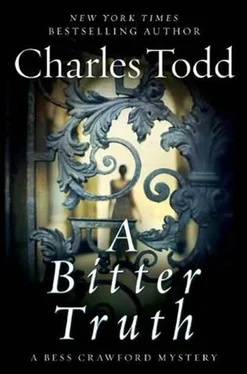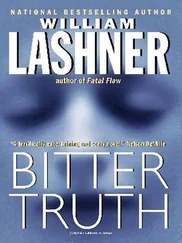I was shocked. “She’s dead?” It was all I could manage to say.
“She died when she was only six years old. Of a mastoid tumor. Roger won’t speak her name. It’s as if she never existed. He was closer to her in age than Margaret and Alan. Alan, when he came of age, turned Vixen Hill over to Roger. He felt he couldn’t live there, and he bought a house in Portsmouth before joining the Navy as a career officer. Margaret married young. I think to escape. Although it turned out well enough. She and Henry have been very happy.”
“Did you-were you told these things before you married Roger Ellis?” I asked.
“I told myself I’d make Roger forget Juliana. But you can’t really change people, can you? We took a house in London for the first six months, and then I could tell that he missed Vixen Hill. Alan could walk away, you see, but Roger couldn’t. And so we returned to Sussex.” Putting a hand to her head, she said, “I wish this pounding would stop.”
I didn’t remind her about her promise.
We pulled into a station at that juncture, and in the flurry of people getting down or settling into seats, conversation was impossible. Lydia closed her eyes, and I thought she slept for a quarter of an hour or so.
We reached the station just outside of Hartfield in the early afternoon. I was glad, for the train was stuffy and so crowded we could hardly hear ourselves think. I said, as Lydia and I stepped down into a small station hardly worthy of the name, “How far is it to Vixen Hill?”
“Not far, as the crow flies,” she said, handing in our tickets. “There’s a carriage we can hire to take us there. I was so fortunate the day I left-a neighbor was on her way to Hartfield to do her marketing, and she was willing to take me to the station. I wouldn’t have wanted to walk-I’d have missed my train for one thing. But I would have walked, you know. I was that desperate to get away.”
We found the carriage without any trouble, and the driver, an elderly man with a foul-smelling pipe, was more than willing to take us to Vixen Hill. We were soon on our way through the village of Hartfield. It was prosperous enough, with cottages and houses leading into a street of shops and an inn. I could see the tower of a church up a side street, and farther along, I glimpsed the doctor’s shingle on a house facing a small shop selling dry goods.
Several people turned to stare, but I thought that had more to do with the fact that I was a stranger than with Lydia’s bruised face and blackened eye. Still, she kept her gloved hand raised, as if to keep her hat from blowing off.
I heard her murmur, “I knew this would be an ordeal.”
“It will be over soon. There’s the end of town in sight already.”
We came to a slight bend in the road just before the outskirts, and I turned to my left, aware of someone watching us. My gaze met that of the village constable standing there.
I was used to the constable who walked past Mrs. Hennessey’s house each evening and paused to pass the time of day with her. And to the constable in Somerset whose children brought us fresh strawberries from his garden every spring. Comfortable figures who kept order and were a part of the fabric of our lives.
This man was cut from a different cloth, and I thought perhaps he’d been in the war, wounded and discharged, for his face was hard, his eyes cold, as if he remembered too much and had no way of forgetting.
And then Hartsfield was behind us, and the heath, encroaching on the outskirts, as if lying in wait, quickly surrounded us. I was used to the moors in Devon and Cornwall. But this was dramatically different, low, black twisted branches of stunted heather and gorse filling the horizon now as far as the eye could see.
The land was sour, bare in places, in others dotted with blighted shrubs and what appeared to be the struggling remnants of grasses and other vegetation that had given up long ago.
“This is where you live?” I asked, surprised. I’d been to Sussex before, lovely villages and a countryside that was inviting. This was quite different.
“Ashdown Forest,” Lydia murmured. “I hate it. In winter it sucks the life out of you, leaving you as twisted and dead as it is. Winter bleak, that’s what it is.”
Apparently, from what she was telling me as we held on tightly on the now bumpy ride over winter-rutted tracks that bore little resemblance to roads, Ashdown Forest had been a hunting preserve of kings. A ditch had surrounded it to keep the animals in and the peasant poachers out.
“You can still find bits of the ditch if you know where to look. But the forest has long since disappeared. There are stands of trees here and there, mere remnants of what used to be.”
I could see why she called it winter bleak.
The day was overcast now, and that did little to make the drab brown and black landscape more appealing. In the far distance I glimpsed sheep grazing, which must have meant that this wiry and unappealing growth was nourishing. But there was so little color to this palette. Even the moors in the West Country were greener and more inviting.
I said, “Is it always so dreary?”
“To be fair, in the spring when the gorse blooms, it’s touched with green and gold. And in summer the ling-the heather-flowers. A carpet of lavender, and it comes right to the edge of the lawns. But I know winter is coming when I see the ling blooming, and that’s depressing. Winter seems to last longer than any other season. When my brother was alive, I’d find an excuse to go to Suffolk for a week or so. We were close, he and I, and while I like his wife well enough, sadly we have very little in common. After he was killed, I began to feel like a guest there on sufferance.”
Roger, I thought, sounded rather selfish. And so did her brother’s widow, for that matter.
She fell silent, as if bracing herself for what was to come.
As we moved deeper into Ashdown Forest, the landscape became even more bleak, if that was possible. The occasional sheep or cows, the handful of horses, seemed overwhelmed by the silence. From time to time we moved into the shadow of trees, their bare branches arching over our heads like the high ribbed ceiling of a cathedral nave. Occasionally I saw narrow, overgrown paths leading off into denser growth, mysterious, almost secretive.
I was hard-pressed to tell one featureless track from the other as we made our way across the heath. I found it difficult to imagine that this was once a great forest, with deer and whatever else a king chose to hunt confined here awaiting his pleasure. That was a chilling thought, that the animals were all but penned here, until he and his cronies came again to slaughter them. I was beginning to feel rather vulnerable myself in this strange world, and I compared it to the blighted landscape of France where war had destroyed every vestige of grass and trees and fields. Very different-and yet in some way, very much the same. I couldn’t quite put my finger on the similarity until I realized that no one seemed to live here either. A wasteland of man’s making. No Man’s Land. Just then I saw the distant broken arms of a windmill, but the house attached to it was not visible.
We turned off the track into a lane, bordered by a line of ash trees, that led in turn to a red brick house whose lawns ended abruptly at the edge of the gorse and heather. As if a line had been drawn, and the wildness told not to cross it. Or had the wildness told the grass to encroach no farther?
I wondered if the house had begun life as a hunting lodge, because there was a tall central block that appeared to be older than the wings to either side, the brick a mellow rose. High above the door, an oriel window broke the plainness of the facade, the panes dark and lifeless under the dull sky. Gardens graced the lawns where the lane became a drive looping back on itself. But at this time of year the gardens too were dead, bare beds with no promise of spring, not even a brave bit of green from a tulip or daffodil poking tentatively up.
Читать дальше












